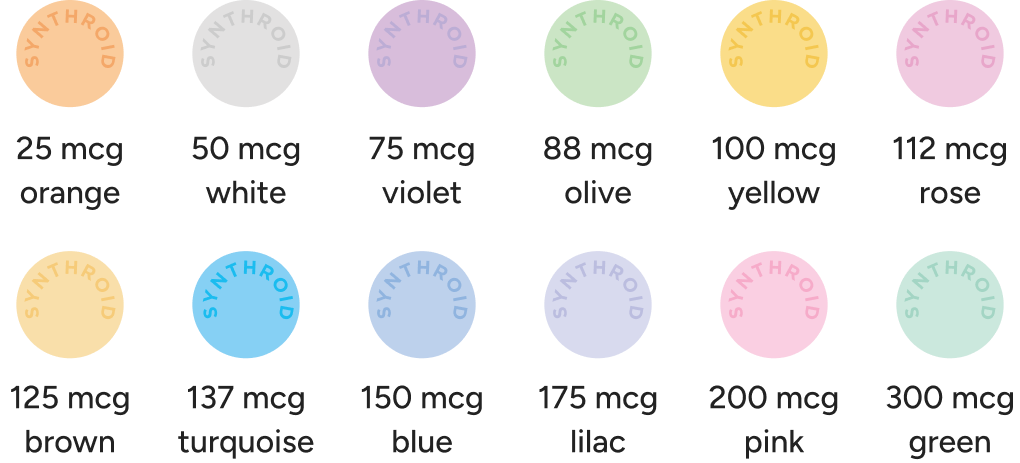Stay on track with your treatment
Keep this cheat sheet handy for fast facts about Synthroid and how to take it the right way.
Download cheat sheetHow you take Synthroid matters. Explore the tabs below to find everything from factors your doctor will consider when choosing your starting dose, to what you can expect long term. As always, be sure to follow up with your doctor on any questions you may have at your next appointment.
There's no one dose that's right for all people with hypothyroidism. That's why Synthroid comes in a variety of dosing strengths to match each person's exact needs.

Synthroid comes in 12 dosing options to help your doctor find the dose that's right for you. Your doctor will determine your starting dose based on your weight, age, cause of hypothyroidism, and other health conditions, as well as other medications you’re taking.
Tablets shown not actual size and may not represent exact color.

Finding the right dose
Hear the steps Wendy took to make sure she found the right doctor—and the right dose.

What to expect when starting Synthroid
When you first start taking Synthroid, your doctor will usually test your TSH levels every 6 to 8 weeks. Because your thyroid hormone needs are very precise, your doctor may need to make small adjustments to find the dose that’s right for you.
It may take several weeks before you notice Synthroid is working and for your thyroid hormone levels to adjust to the correct range.
The way you take Synthroid can affect how much medicine your body is getting. That's why it's critical to take Synthroid as your doctor prescribes, and to take it the same way, every day.
Remember these quick tips on how to take Synthroid:
Once a day
Take Synthroid once a day, every day, at the same time before breakfast.
On an empty stomach
Only take Synthroid with water and on an empty stomach.
Wait 30 minutes
Wait 30 minutes to 1 hour before eating or drinking anything other than water.


Establish your dosing routine to help you remember to take Synthroid the same way, every day.
Here are a few helpful suggestions:
Keep Synthroid beside something you see or use when you wake up in the morning. It could be by your phone, toothbrush, or keys.
If you walk your dog every morning, place a sticky note near the leash. If you read the morning news on your smartphone or tablet, place a sticky note on it.
Use a weekly pillbox to help you plan timing for your medication and avoid dosing errors.
Turn your medicine bottle or weekly pillbox upside down after you take Synthroid. Before going to sleep, turn your bottle right side up so you know to take Synthroid in the morning.
You can also sign up to get daily reminders via text or email to take your Synthroid.
Looking to take advantage of these helpful reminder tools?
Many people who think they're taking Synthroid might actually be taking a generic.
Did you know: 1 out of every 3 people who think they’re taking Synthroid aren’t
Although your doctor may have prescribed Synthroid in some cases it can be switched to a generic brand at the pharmacy without you even realizing it.
That’s because some generics come in the same shapes, colors, and doses as Synthroid.
The Food and Drug Administration has determined that certain levothyroxine products are interchangeable and can be substituted at the pharmacy.

You worked closely with your doctor to find the dose of Synthroid that’s right for you, so if your doctor prefers for you to stay on Synthroid, here are ways to make sure you get brand name Synthroid.
Enroll in the Synthroid Delivers Program
To make it even simpler to make sure you always get Synthroid, enroll in the Synthroid Delivers Program and have Synthroid delivered right to your door for only $25 a month for a 90-day prescription.*
*Other pricing available for 30 days ($29.50) and 60 days ($54). See full pricing information. Terms, conditions, and eligibility restrictions apply.
Ask your doctor to note their preference on your prescription
Without specific instructions for the pharmacy, such as DAW or “Dispense As Written,” you may get switched to another treatment without your knowledge, depending on your state’s pharmacy laws.
Inform your pharmacist
Always let your pharmacist or mail-order pharmacy know that you and your doctor prefer brand-name Synthroid.
Check your pills
Before leaving the pharmacy (or as soon as your prescription arrives in the mail), check the pill to ensure it says “SYNTHROID.” If it doesn’t, let your pharmacist know what you and your doctor prefer.
Making sure it’s Synthroid
Find out how Wendy works with her doctor and her pharmacy to make sure she’s getting brand-name Synthroid, as her doctor prescribed.


Hypothyroidism is a lifelong condition that requires lifelong treatment. By continuing to take Synthroid as your doctor prescribed and getting your levels checked regularly, you can help keep your thyroid hormone levels where they should be.

Taking the initiative
Elisa talks about how she takes an active role in her hypothyroidism treatment with Synthroid.

Keeping your thyroid hormone levels in balance takes commitment–that's more than just taking a pill. It means:
Keep reading to see how you can take an active role in managing your hypothyroidism, so you can help keep your thyroid hormone levels where they need to be.

Keeping tabs on TSH
Once you are on a stable dose of Synthroid, it’s important to have your thyroid hormone levels tested every 6 months to a year, or sooner if you’re experiencing symptoms.
A TSH test is used to check the level of thyroid-stimulating hormone (TSH) in the blood, and it helps your doctor determine if you’re receiving the right dose of medicine. And while a TSH test can tell your doctor a lot, it’s just one part of the picture. What your body tells you is also important.
Your dose may need to be adjusted over time
Throughout your lifetime, your doctor may have to adjust your dose of Synthroid. That’s because the amount of thyroid hormone your body needs may change. Some of the reasons for this may include major life events such as pregnancy, menopause, or aging.


SYNTHROID® (levothyroxine sodium) tablets, for oral use is a prescription, man-made thyroid hormone that is used to treat a condition called hypothyroidism in adults and children, including infants. It is meant to replace a hormone that is usually made by your thyroid gland. Generally, thyroid replacement treatment is to be taken for life. SYNTHROID should not be used to treat noncancerous growths or enlargement of the thyroid in patients with normal iodine levels, or in cases of temporary hypothyroidism caused by inflammation of the thyroid gland (thyroiditis).
This is the most important safety information you should know about SYNTHROID. For more information, talk with your doctor.
You are encouraged to report negative side effects of prescription drugs to the FDA. Visit www.fda.gov/medwatch or call 1-800-FDA-1088.
If you are having difficulty paying for your medicine, AbbVie may be able to help. Visit AbbVie.com/myAbbVieAssist to learn more.
US-SYNT-220158